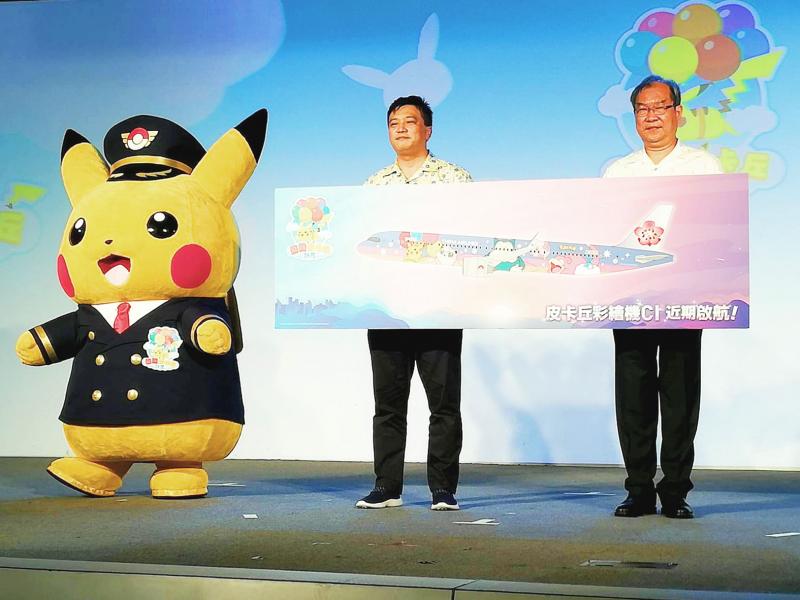China Airlines Ltd (CAL, 華航) is planning to offer 40 percent more passenger flights this quarter than last quarter, as air travel demand is rising, the company said yesterday as it announced the launch of a Pokemon-themed jet.
The airline is planning to paint one of its Airbus A321neo planes with a livery representing the Japanese animation, video game and mobile game franchise, China Airlines told a news conference in Taipei.
Eleven Pokemon characters would be depicted on the fuselage, including Pikachu, Jigglypuff and Snorlax, while the Poke Ball, which players use to capture the characters in the games, would be depicted on the engines, the airline said.

Photo: CNA
“It is the first time that The Pokemon Co partners with a foreign airline to launch a Pokemon-themed airplane,” the company said, adding that it took about two years for the two sides to prepare for the launch.
As the COVID-19 pandemic affects air travel worldwide, the Japanese firm runs a project called “Flying Pikachu” to encourage people to regain their enthusiasm for travel, and the collaboration with CAL is part of the project, Pokemon executive Susumu Fukunaga said.
The Pokemon-themed airplane would be used for flights to North Asian and Southeast Asian destinations, China Airlines said.
It is not easy to forecast when travel demand will fully recover given the emergence of new variants of SARS-CoV-2, but demand should rise more than 40 percent this quarter, CAL president Kao Shing-hwang (高星潢) said.
The airline would steadily increase the number of passenger flights and is planning to offer more flights to London; Bali, Indonesia; and Sapporo, Japan, this quarter, Kao said.
Asked whether ticket prices would remain at a higher level than before the pandemic, Kao said prices would be determined by supply and demand, and might drop during the slow season.
The number of passenger flights would not increase drastically in the near term, the airline said, adding that it expects its air cargo business to remain stable this quarter.

SEMICONDUCTORS: The German laser and plasma generator company will expand its local services as its specialized offerings support Taiwan’s semiconductor industries Trumpf SE + Co KG, a global leader in supplying laser technology and plasma generators used in chip production, is expanding its investments in Taiwan in an effort to deeply integrate into the global semiconductor supply chain in the pursuit of growth. The company, headquartered in Ditzingen, Germany, has invested significantly in a newly inaugurated regional technical center for plasma generators in Taoyuan, its latest expansion in Taiwan after being engaged in various industries for more than 25 years. The center, the first of its kind Trumpf built outside Germany, aims to serve customers from Taiwan, Japan, Southeast Asia and South Korea,

Gasoline and diesel prices at domestic fuel stations are to fall NT$0.2 per liter this week, down for a second consecutive week, CPC Corp, Taiwan (台灣中油) and Formosa Petrochemical Corp (台塑石化) announced yesterday. Effective today, gasoline prices at CPC and Formosa stations are to drop to NT$26.4, NT$27.9 and NT$29.9 per liter for 92, 95 and 98-octane unleaded gasoline respectively, the companies said in separate statements. The price of premium diesel is to fall to NT$24.8 per liter at CPC stations and NT$24.6 at Formosa pumps, they said. The price adjustments came even as international crude oil prices rose last week, as traders

SIZE MATTERS: TSMC started phasing out 8-inch wafer production last year, while Samsung is more aggressively retiring 8-inch capacity, TrendForce said Chipmakers are expected to raise prices of 8-inch wafers by up to 20 percent this year on concern over supply constraints as major contract chipmakers Taiwan Semiconductor Manufacturing Co (TSMC, 台積電) and Samsung Electronics Co gradually retire less advanced wafer capacity, TrendForce Corp (集邦科技) said yesterday. It is the first significant across-the-board price hike since a global semiconductor correction in 2023, the Taipei-based market researcher said in a report. Global 8-inch wafer capacity slid 0.3 percent year-on-year last year, although 8-inch wafer prices still hovered at relatively stable levels throughout the year, TrendForce said. The downward trend is expected to continue this year,

POWERING UP: PSUs for AI servers made up about 50% of Delta’s total server PSU revenue during the first three quarters of last year, the company said Power supply and electronic components maker Delta Electronics Inc (台達電) reported record-high revenue of NT$161.61 billion (US$5.11 billion) for last quarter and said it remains positive about this quarter. Last quarter’s figure was up 7.6 percent from the previous quarter and 41.51 percent higher than a year earlier, and largely in line with Yuanta Securities Investment Consulting Co’s (元大投顧) forecast of NT$160 billion. Delta’s annual revenue last year rose 31.76 percent year-on-year to NT$554.89 billion, also a record high for the company. Its strong performance reflected continued demand for high-performance power solutions and advanced liquid-cooling products used in artificial intelligence (AI) data centers,